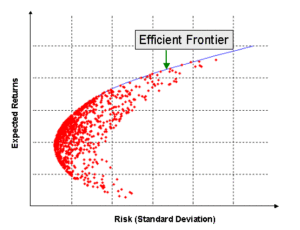I remain stuck on Dr. Richard Thaler and his findings that won him the Nobel Prize in Economics. Dr. Thaler’s findings put him at odds with previous economics theoreticians, most notably Professor Harry Markowitz. Markowitz is not a Nobel laureate – at least not yet – but his Efficient Frontier theory is a cornerstone of modern finance and modern portfolio theory.
The Efficient Frontier

Pioneers lived on the frontier, but it wasn’t very efficient. Staying alive every day was a struggle. Personally, I wouldn’t have made it very long on the frontier in the Wild West. I am a creature of comfort, and not willing to risk life and limb for land opportunities in the West.
But, that’s not the frontier we are talking about here. Dr. Markowitz’s frontier has to do with optimal risk and return. He posits that investors will always choose an investment that provides them with the highest return with the lowest risk. For instance, let’s say there are 3 different investments:
a) a 10% return with a 1 standard deviation (measure of risk),
b) a 9% return with a 1.5 standard deviation, and
c) a 8% return with a 0.7 standard deviation.
The rational investor would likely choose the first and possibly the third (absent additional information), but would not choose the middle investment, the one with 9% and 1.5. Why? Because the first investment offers a better return with less risk, and because the third investment offers a lower return but also with lower risk. Dr. Markowitz says the first and third investments are on the Efficient Frontier, but the second investment is not. The second investment’s price will have to go down, and its corresponding return needs to go up, in order for it to move into the efficient frontier.
Portfolios of assets that lie on the efficient frontier are a continuum, and so they can be represented in graphic form, as follows:

People vs. Econs
Dr. Markowitz’s underlying assumption is that of the “rational investor”, who is someone who is machine-like and able to make rational, quatitatively-based financial decisions about their own portfolios instantaneously. These decisions include not only individual stock investments, but also asset class allocation decisions, such as 70% stocks/30% bonds vs. 50%/50%, and the like. Doesn’t that sound like a big ask of people? Dr. Thaler says this type of rational, machine-like thinking is not consistent with ordinary people. Dr. Thaler calls people who can make Markowitz-approved decisions “econs”, which sounds like machine-like people. Everyone else are “people”, and people are fallible, and not able to always make rational decisions about their finances, portfolio allocation, or many other self-interested decisions. People are human, according to Dr. Thaler, and therefore apt to make poor, or non-rational, decisions. That’s why people will still invest in stocks and portfolios that are the dots on the graph above that are not on the efficient frontier parabola.
Who’s right?
If Dr. Thaler is right about humans and their inherent fallibility – after all, he just won the Nobel Prize – does that make Dr. Markowitz wrong about his efficient frontier theory? No, Dr. Markowitz is not wrong. One should not choose an investment or portfolio with a lower return and higher risk. He is, however, purely theoretical in his approach, and does not address the behavioral economics aspect of human decision making.
Real Econs
Econs, in Dr. Thaler’s view, are fully rational humans. The Mr. Spocks of the investment world. They make unemotional decisions based wholly on facts. You know who or what else can make such decisions? Computers. Hence, the rise of Robo-Advisers, such as Betterment and Wealthfront. If followed to a T, the investment decisions put out by these robo-advisors can minimize the effect of human fallibility. Dr. Thaler should approve, although I have not read of his opinion about them.
IMO
I am not advocating that investors should move to robo-advisors. That would not be good for my business. I am only pointing out that there are differing theories out there on investment and portfolio management and that it is good for us all to be cognizant of these theories and to forgive one’s self for making incorrect or not-fully-informed decisions because we are human beings. Thank you, Dr. Thaler, and enjoy the Nobel Prize accolades!
